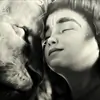The revelation in the title was a double bill: first that of Jalal's identity to Jodha, and then, to her and to us, that of how far his icy courage, even with death staring him in the face, his astuteness, and his quick-wittedness could go. A bunch of unanswered questions rounded it off.
Jalal was in top form, and despite the Damocles sword of having to rescue Abdul hanging over his head, he seemed to be enjoying himself like a lively, resourceful schoolboy playing truant.
Carrying Jodha's palkhi in order to be able to peep up at her; it had me in stitches. Staring with wide-eyed disbelief at Jodha as she recites all his misdeeds to Suryabhan. Rushing to Abdul's cell and abusing him loudly in order to attract his attention.
The Shahenshah standing to attention in front of the cell, eyes discreetly lowered, as Jodha approaches, but still casting sidelong glances at her. The suppressed mischief in his eyes as he looks at her full in the face and, asked where he is from, answer, truthfully but deviously: Umarkot. The fluent rural Rajasthani dialect, undoubtedly a carryover from his childhood in Umarkot. The cheekiness with which he comments, after having 'proved' himself to be a Rajput soldier, about the perils of doubting.
The astuteness with which he locates the identifying mark on the dead guard's arm and duplicates it on his own with the point of his knife. The attention to detail shown by the fact that before going into the prison as a soldier, he turns all the three rings on his right hand inside , so that the valuable stones do not show and thus betray him as not being a simple soldier.
The superb swordsmanship that could overcome and disable at least 11 soldiers - this was my count, but there might have been a couple or so more at the sides - and then the sheer physical strength needed to bend those thick prison bars so that he could enter the cell, cut the chains and rescue Abdul. This last reminded me (and Holmes aficionadas will bear me out) of Dr. Grimesby Roylott in The Speckled Band, who could bend a steel poker. And of course Sherlock Holmes himself, who could straighten out the bent poker!
Finally, the arrogant declaration of both his identity and his intent in the message (bilingual, obviously for the benefit of the Rajputs and us, but why then the Persian version?) left on the prison floor, and written in the only medium available, blood, presumably that of the 11 incapacitated guards. This is vintage Jalal all over, for by doing so, he further jeopardises his already tough escape, and in the pre-cap, is getting ready to fight a round dozen opponents with a limp Abdul on his hands to boot. But of course we know that, like d'Artagnan in The Three Musketeers, our boy wonder will emerge a winner, which is the only saving grace!
Jodha does not have that much to do today. But in the striking face to face encounter with Jalal in the prison, when she sees the identification mark on his arm, her genuine regret and her desire to make amends, even to a simple soldier, for having suspected him wrongly, are brought out very convincingly. Her face softens and the eyes offer an unstated apology.
Her outraged recital of Jalal's assorted sins was obviously made within his earshot so that, for the first time ever, he could get a clear idea of how he appeared to an outsider. Even Abdul's mocking smile disappears when she mentions the foot-chopping and the desecration of temples.
In the end, what stands out, above all else, is Jalal's ice-cold nerve. With a sword at his throat, and betrayal and death only inches away from him, he still does not bat an eyelid, and not a muscle moves in his face as he brazens it out. He is obviously one of those who habitually play at dice with death.
The questions:
1) Jalal could neither read nor write. So the message must have been written by Abdul, even in his battered and exhausted state. The blood would have had to be taken from the wounded soldiers scattered all over the hall in front of the cells. Abdul is a cripple, and his crutches are nowhere in evidence. How on earth was this calligraphic exercise accomplished, and how long did it take? Ten minutes would seem an underestimate.
2) Where was the time for Jalal to fight the soldiers, pull Abdul out of the cell, and get the message done before the royal group returned to that hall?
3) The departing contingent led by Jodha and Suryabhan is very close to the prison hall. Even as they are looking at the dead guard being carried in, they are alerted by a loud groaning sound, presumably from Jalal's wounded victims, and rush back to the hall, to find the bird flown. Now the prison is not a rabbit warren of many corridors, but seems to be consist only of the main hall and some adjacent halls. How then did no one see Jalal rescuing Abdul after disposing of 11+ soldiers, and carrying him out of the prison? And where were Suryabhan and Jodha when all this mayhem was under way?
4) The carryover question from the last episode. The guard whom Jalal kills is as skinny as a rake. How come his uniform fits Jalal without splitting under the armpits?😉




























68